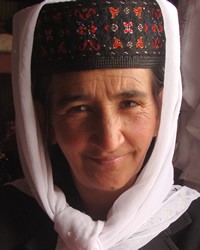Tajik, Sarikoli in China

Photo Source:
Anonymous
|
Send Joshua Project a map of this people group.
|
| People Name: | Tajik, Sarikoli |
| Country: | China |
| 10/40 Window: | Yes |
| Population: | 44,000 |
| World Population: | 44,000 |
| Primary Language: | Sarikoli |
| Primary Religion: | Islam |
| Christian Adherents: | 0.00 % |
| Evangelicals: | 0.00 % |
| Scripture: | Translation Needed |
| Ministry Resources: | No |
| Jesus Film: | No |
| Audio Recordings: | No |
| People Cluster: | Tajik |
| Affinity Bloc: | Persian-Median |
| Progress Level: |
|
Introduction / History
The history of the Tajik dates back to the biblical time of Abraham. Around 1000 BC the first Persians started to forge a prominent place in history for themselves. The Old Testament records the Persians some 43 times, showing them to have a key role in God's redemptive plan. The Persian King Darius, mentioned in the sixth chapter of Daniel, today lends his name to the Tajik language called Dari in Tajikistan and Farsi in Afghanistan.
The Tajik nationality in China speaks two distinct languages: Sarikoli and Wakhi. Many of them also understand some Uyghur and Mandarin Chinese because of increasingly frequent contact with these larger people groups. Children are now also mostly forced to attend Chinese schools for the purpose of assimilation, so this generation will grow up to speak fluent Mandarin. The Tajik are probably the one group in China most unlike the Han Chinese. They are a Caucasian people with light skin. Many have green or blue eyes and fair hair. They speak a Persian (Iranian) language which is part of the Indo-European language group. The term Tajik is applied to various Iranian-speaking groups of Central Asia in differing ways.
Three quarters of China's Tajiks speak Sarikoli. It is described as "a language entirely different from the majority language spoken in Tajikistan." The Tajik in China do not have their own written script, but some use the Uygur orthography. The two Tajik languages in China are reportedly different enough that speakers from each group must use Uygur to communicate.
What Are Their Lives Like?
The Sarikoli Tajiks have lived in tribal and clan structures for centuries. Their homes are traditionally built with stone for protection against the extreme cold, but recently these homes are being destroyed in favor of more modern government housing and apartments.
What Are Their Beliefs?
The Tajiks are one of the few groups in China who adhere to the Shia sect of Islam. They do not have mosques. Instead, they meet in their homes once a week for prayer and worship. Before the arrival of Islam in the tenth century, most Tajiks were Christians, having been converted by Nestorian missionaries starting in the seventh century. The Apostolic Church of the East—which had eight million Christians throughout Asia—was destroyed, and all trace of Christianity disappeared.
The Tajik are one of the most unreached groups in China. In the 1920s a lone worker stated, "I am sorry to say that in accordance with my knowledge of conditions I cannot pretend this field to be ready for harvest, however, the need of sowing is utterly pressing. Workers intending to scatter the gospel seed in this country ought to know beforehand that their task is not to gather harvest in joy but to sow in tears." Although today there are more than 400 believers in Tajikistan, the Tajik Scriptures and JESUS Film are not understood by the Sarikoli Tajik in China, although gospel recordings are available in their language.
What Are Their Needs?
The Sarikoli Tajiks people need to put their trust and identity in the hands of the loving God of Creation who sent his son to make it possible for them to enter the Kingdom of God.
Prayer Points
Pray for the spiritual blindness to be removed so they can understand and respond to Christ.
Pray for the Lord to provide for their physical and spiritual needs as a testimony of his power and love.
Pray the Sarikoli Tajiks people will have a spiritual hunger that will open their hearts to the King of kings.
Pray that the Bible would be translated accurately and that recordings could be effectively distributed to the entire people group.
Pray that the few believers would be filled with love, power, and boldness from the Holy Spirit and faithfully give what they have received freely from God, so that an unstoppable movement to Christ would take root among them.